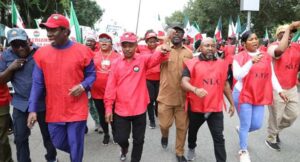The ongoing strike led by the Nigerian Labour Congress (NLC) and the Trade Union Congress (TUC) has escalated tensions within the Federal Capital Territory Administration (FCTA) and the Federal Capital Development Authority (FCDA). This strike action, particularly evident on Monday, was marked by a significant increase in union activity.
Members of the Joint Union Action Committee (JUAC) effectively blocked the main entrance to the FCT Administration, commonly referred to as the Minister’ s Gate. This action prevented employees from accessing their offices, thereby crippling the usual operations.
As the strike intensified within the Federal Capital Territory (FCT), noticeable disruptions ensued. Workers congregated in confusion at the gate, where union leaders strictly enforced adherence to the strike, barring entry and exit. The atmosphere at the Minister’ s Gate was characterized by a complete halt in operations and increasing anxiety among employees.
JUAC President Comrade Rifkatu Lortyer took a resolute position, asserting that the blockade would remain until their demands were satisfactorily met by the authorities. She issued a clear directive to FCTA and FCDA workers to stay at home, emphasizing the need for compliance with the strike’ s guidelines.
The strike, launched by national labor unions, is rooted in unresolved issues concerning wage adjustments and working conditions. The resulting standstill in the FCT’ s administrative functions indicates a deepening crisis that could potentially disrupt
Lortyer highlighted the long- standing struggle over the minimum wage and the recent addition of increased electricity tariffs to the list of grievances. She emphasized that, despite prolonged negotiations, the government had yet to reach a satisfactory compromise. Given the national declaration of the strike by NLC

Currently, security personnel are stationed at the entrances of both the FCTA and FCDA, underscoring the serious nature of the ongoing
The protest reflects broader national discontent, particularly among public sector workers who have been grappling with stagnant wages and rising living costs. The minimum wage dispute, compounded by the added burden of increased electricity tariffs, has exacerbated frustrations, leading to the current impasse.
The NLC and TUC, representing a significant portion of the Nigerian workforce, have been advocating for improved wages and working conditions for years. The government’ s failure to address these issues adequately has now culminated in a large- scale strike that is severely affecting the FCT’ s administrative operations.
In the heart of Nigeria’ s capital, the strike’ s impact is most palpable. The blockade of the Minister’ s Gate is not just a physical barrier but a symbol of the broader struggle for workers’ rights and fair compensation. Employees, caught between union directives and the necessity of their jobs, find themselves in a precarious situation
Union leaders have been vocal about their dissatisfaction with the government’ s handling of wage negotiations and the imposition of higher electricity tariffs. These leaders argue that the government’ stance has been insufficient and that more substantial measures are required to meet the basic needs of the workforce.

In conclusion, the strike led by NLC and TUC, with the JUAC playing a pivotal role in the FCT, has brought significant disruptions to the administrative functions of the FCTA and FCDA. The steadfastness of the unions in enforcing the strike and the government’ s current response will be crucial in determining the future trajectory of labor relations in Nigeria. As both sides navigate this complex situation, the hope remains for a swift and equitable resolution that







